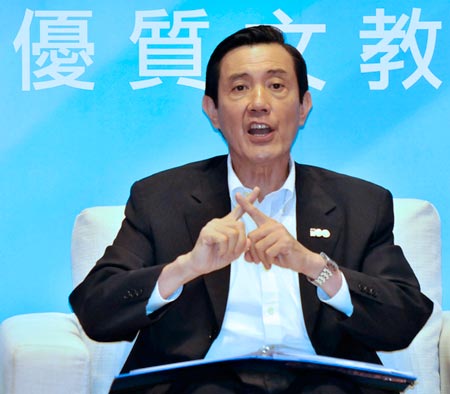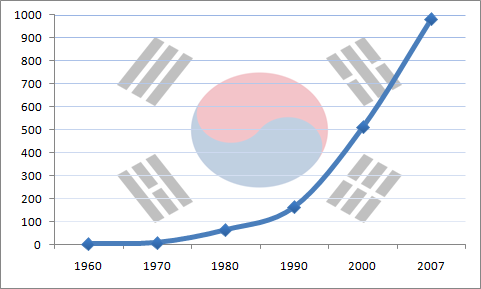Kinda demolishes pro-Communist Joe Hung's lunatic contention that China follows the "kingly way, which is based on benevolence, justice and morality," doesn't it?
Tag: China
No One Expects The Shuanggui-sition
The Belmont Club on Xi Xinping's purges of the Chinese Communist Party:
The Shuanggui pronounced (SHWANG’-gwei) is the secret police of the Communist Party of China, otherwise known as the Central Commission for Discipline Inspection or CCDI. They don’t arrive with flashing lights and thumping rotors. They just show up and then they take you with them, often forever. And they’ve been hard at work arresting tens of thousands of Chinese communists, torturing them to extract confessions and otherwise rounding up anyone connected with Zhou Yongkang, recently the internal security chief of China and head of its oil industry; one of the most powerful men in China now headed for life imprisonment and secret death.
Massive Water Diversion Projects In China
This Looks Like A Job For Gavin Menzies!
How To Torture Dogs For Fun And Profit
How China Is Targetting America’s Military
President Ma Ying-jeou Of Taiwan Asks The Japanese To Do His Job For Him
President Ma Ying-jeou on Friday told a Japanese envoy that the Asian country should review the imbalance of tourist flow between the two nations.
[…]
[In a previous meeting with former Deputy Minister Okada Katsuya, the] president was quoted to have said that Taiwanese tourists visiting Japan greatly exceed that of Japan to Taiwan, and that Japan should take measures to rebalance the difference.
Perhaps it's not surprising that Ma's response to this "problem" is both lazy and incompetent. Because the most obvious solution is for his government to pony up the funds for a tourist promotional campaign in Japan.
But of course, that would take effort.
His government could also get off its duff and do a marketing study about how to make the country more attractive to Japanese tourists, and then go about following the study's recommendations.
More work, again.

(President Ma Ying-jeou makes the teenage "crucifix"-gesture to ward off the evil expectation that he do the job he was elected to do. Whined Ma: "Oh, maaaaan, Foreigner, all your proposals sound TOO HARD. Why can't I just let somebody ELSE do it, instead?" — Image from the Want China Times.)
Another option would be for his government to stop going down-market with its ardent pursuit of low-income Chinese tourists. It's entirely possible that concentrating on this niche discourages higher-income Japanese from visiting…
A different angle would be for Ma to tackle some of the anti-Japanese bigotry that the KMT fostered during its decades-long misrule of the country. I once witnessed (with my own eyes) a Taiwanese woman in her 30s walk up to a Japanese man in a bar and, unprovoked, tell him straight to his face in English, "I don't like Japanese."
(Fortunately, it was a foreigner pub, and there weren't any Taiwanese men around. The situation might have escalated quickly had any drunken, Japan-hating, Chinese nationalists been present.)
By my reckoning, that Japanese man probably told his family and a few of his co-workers about his unfortunate experience with Taiwanese hospitality. Undoubtedly, a few other Japanese later heard about it second-hand. Does Mr. Ma think that's the kind of word-of-mouth which encourages Japanese visits to Taiwan?
Finally, if Ma Ying-jeou wants more Japanese tourists (or tourists from any country, really), he could see to it that the country's legal system charges and prosecutes Taiwanese who assault tourists. His pathetic failure to do so is certain to leave a few foreign tourists crossing Taiwan off their itineraries.
Update: After sleeping upon it, I realized this post gave the false impression that Taiwanese in general behave badly towards Japanese tourists. So to clarify: most Taiwanese are cool. Really cool.
However, Taiwan has a very small, ugly minority (who usually prefer to be called "Chinese") which rabidly hates Japan and all things Japanese.
Having made that qualification, an encounter with even one of the latter is enough to ruin a vacation…
UPDATE (Aug 31, 2014): With more temperate language, the Taipei Times makes much the same point.
i-1
Unpleasant Prediction
I hope Tyler Cowen is wrong about this, but…
In Asia, the most likely future candidate for this problem [economic regression] is Taiwan, where real wages were largely stagnant from 2000 to 2011. In 2012, Taiwan’s trend was even more disturbing: Its economy grew 1.3 percent, but real wages fell 1.6 percent, both adjusted for inflation. Taiwanese capital has flowed into China, creating a new class of Taiwanese millionaires but hollowing out the country’s manufacturing base as capital was reallocated to the mainland.
There is an anti-democratic camp in Taiwan which blames the introduction of democracy itself for the country's problems – insinuating that Taiwan would be better off under a KMT autocracy or martial law. This appears to be a post hoc ergo propter hoc fallacy, as the experience of South Korea plainly shows:

(Graph of South Korea's nominal GDP from Wikimedia.org)
Two Asian countries (Taiwan and South Korea) both democratized at roughly the same time, and yet their economic paths after democratization were very different. To my mind, the chief difference between the two is that South Korea didn't leave its own industry to wither on the vine while flooding Communist China with investment capital.
Taiwan, unfortunately, did.
i-1
China Rewrites History On South China Sea
From Strategy Page:
China has ordered its scholars to dig up any historical evidence for early Chinese presence on rocks, reefs and uninhabited islands in the South China Sea…This Chinese effort has one major flaw; it ignores the fact that for thousands of year the Chinese imperial government (which lasted until 1910) disregarded seaward expansion or exploration.
There were a few exceptions, but yes, that's largely true.
Chinese Internet Censorship
The results of an undercover study:
Surprisingly, posts that criticized China's government, its leaders, and its policies, as well as those about sensitive topics such as Tibet, were generally allowed to be published. "Criticisms turn out to be of tremendous value to China's leaders," says lead study author Gary King, a social scientist at Harvard University. "They are a great way of figuring out who's not doing a good job, of seeing which of the roughly 50,000 local governments is being led in a way that is not satisfying people and keeping them in check."
However, posts that mention collective action such as a gathering or protest are often censored, even if they support the government.
"When citizens are able to act collectively in one arena, such as supporting the government, that means they could act collectively in other contexts as well, and the state wants to limit people getting together outside of state control," Pan says. King noted this helped the Chinese government "keep a monopoly on mass action. They don't want someone with the power to move people unless it's the government."
Hat tip: Instapundit